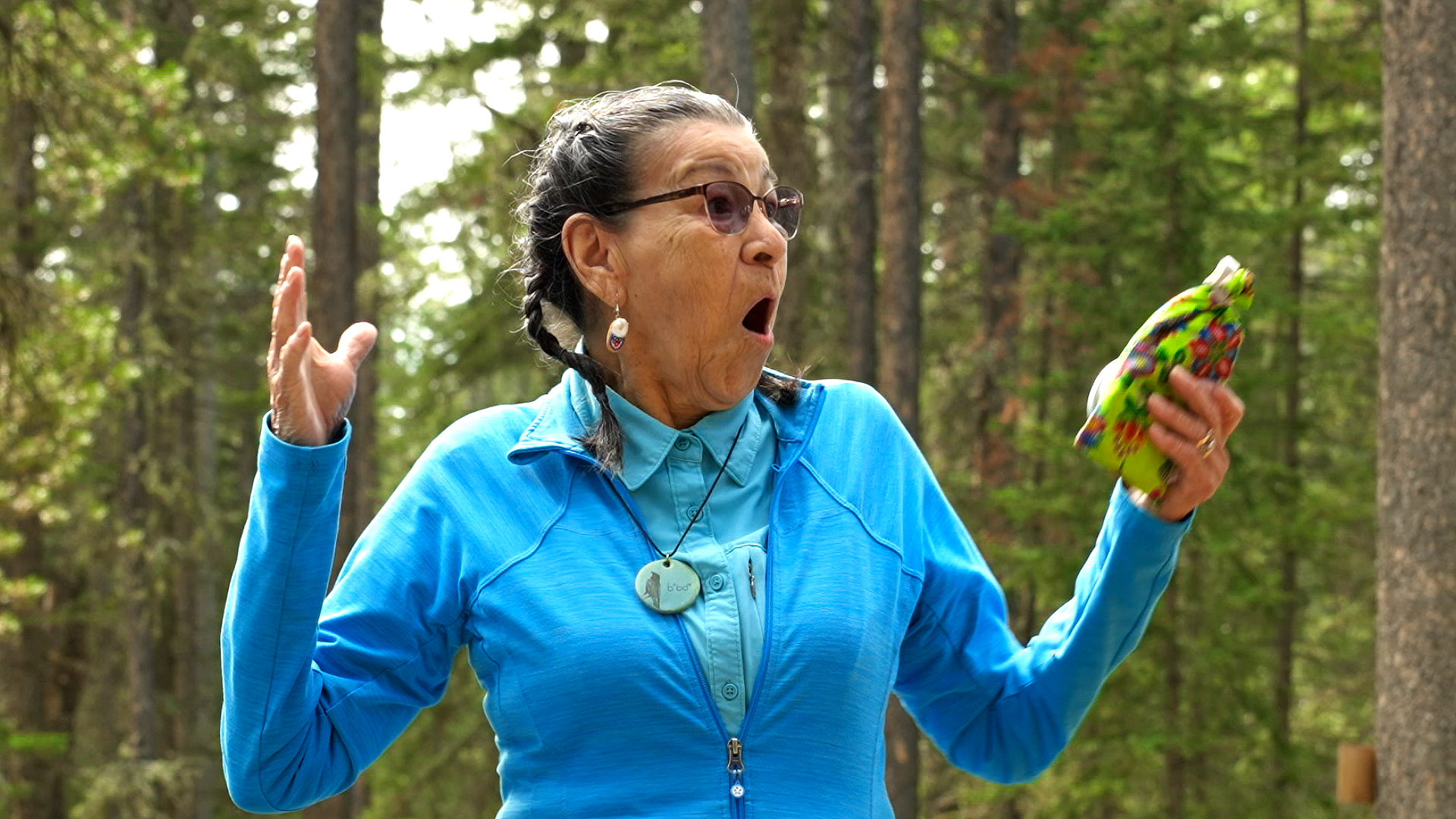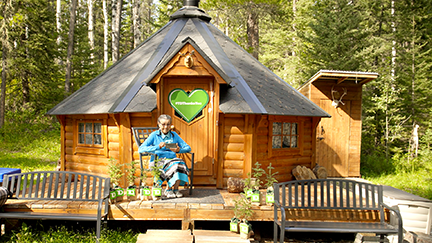
By Odette Auger, Windspeaker.com
Elder Doreen Spence of Saddle Lake Cree Nation has spent a lifetime grounding health and wellness in Indigenous culture.
Her sacred name is Paskostikwannew Kihew iskwew onikaniw (Bald Eagle Woman Who Leads). Recently she’s been providing land-based teachings to future doctors and nurses, but her life’s work has been filled with many initiatives.
She’s been recognized by universities and Indspire, with the Order of Canada, and has even been nominated for the Nobel Peace prize as part of the PeaceWomen Across the Globe project.
This month, Toronto Dominion Bank chose to honour her and will soon plant 1,000 trees to commemorate her work.
She learned of TD Bank’s tribute while she was on the land outside of Moh-kins-tsis (Calgary) working with her helpers to gather windfall to fuel the sweatlodge.
Passing her smudge station and tipi it was very peaceful and quiet. She noticed a stranger sitting in front of a structure and saw that he was wired for sound. Suddenly, people started pouring out their hiding spot in a little house with tree seedlings in their hands.
It was all part of a #TDThanksYou celebration for World Gratitude Day and TD recorded the tribute to Spence. See here: #TDThanksYou: Celebrating World Gratitude Day | TD Stories
“I was just blown away. My daughters were very involved with planning. They know I'm hard to spring a surprise on,” Spence said.
Grandmother Doreen was one of the first Indigenous women to graduate as a practical nurse in 1959. Working in the healthcare system, “being on the inside, there's a lot of things that I saw that really disturbed me,” she said. “You are working within a system that's a colonial system, which is very alien to Indigenous people.”
Within a year of graduating, she was seconded from her Edmonton workplace to High Prairie Hospital. One morning she went to work to find that a 13-year-old girl was scheduled for a tubal ligation.
“There was no consent form. She didn't know what she was going for. Her parents didn't know what she was going for. That disturbed me, and I couldn't figure out what to do.”
Thinking on her feet, she hid the girl’s fasting card from the meal trays to buy some time. She continued on her rounds of giving medication and then ran out of the hospital to the Hudson’s Bay Company.
“I sent a telegraph to the Attorney General's office,” Spence said.
She said the telegraph sent read: “Urgent. I'm potentially going to lose my license because I have a 13-year-old child who's going for a tubal ligation. There is no consent form. She doesn't know. Her parents are unaware. Please advise. The Catholic Constitution states that they cannot force you to do something against your religion. This is against my religion. Please advise me.”
She returned to work and by the afternoon she was called into an office.
“Everybody that counted was there. Every nun, every priest, every doctor, the anaesthetist. They were all there and they rolled me over the coals for hours.”
The Attorney General's office wrote her back, advising she return to her position and she was on the first bus back to Edmonton.
“There were many instances along the way where people were mistreated and you could only speak up and bring awareness,” said Spence.
“And that's the sort of life I lived when I was in nursing.”
She continued as a nurse for more than 40 years during which she says, “I saw little changes in terms of racism towards Indigenous people.”
Using her voice grew into working with initiatives and founding organizations focusing on Indigenous rights, and civil liberties. Cultural survival and traditional knowledge played a role in all of her work.
“Indigenous wellness to me is looking at the entire being—mentally, spiritually, physically and emotionally, and their balance in the universe,” she said.
Paskostikwannew Kihew iskwew onikaniw was raised by her grandparents, Eliza Jane and Washington Howse.
“Granny and great granny were both medicine women,” she said, and Spence recalled being pulled from bed in the night if a call came in.
“We'd go deliver babies or whatever was happening in the community. I was the one that traveled along to be her assistant. So I always had this love and passion for healing and awareness.”
The land-based training she does today includes four vision quests that emphasize the importance of knowing one’s self. She shares the teachings of the four directions, represented by the medicine wheel of four colours.
“But the four realms also teaches me that I must take good care of myself, that I must regain balance and peace and harmony within myself in order to support and help everybody else or anybody else,” Spence said.
“The West direction will teach me that I must go inwards and look at my accomplishments, achievements and shortcomings, and see where I fit in all of that and what I need to be more conscious, be more aware of not passing judgment or blame.”
“It's all inward work,” she said. “More awareness creates more inner strength.”
Her work in Alberta grew to national projects, and then she went international. Spence was invited to the United Nations committee writing the Declaration on Rights of Indigenous Peoples.
Spence shies away from the word “proud” when speaking of the initiatives she’s undertaken, explaining it seems egotistical.
“I always say I’m pleased with the work I’ve done.”
Nowadays, as a keynote speaker, she speaks about “our value-based system” and how the old people lived according to the tipi pole philosophy.
“Each of those poles were a value of how we lived in peace and harmony with all of creation. And this is what's needed nowadays.”
Click here to read the Tipi Pole Values: https://windspeaker.com/buffalo-spirit/each-tipi-pole-teaches-value

When Paskostikwannew Kihew iskwew onikaniw is called to speak at an event, she emphasizes the importance of staying true to oneself, finding strength in culture, and embracing life's journey.
Her speaking engagements take her around the globe.
“When I go to Europe and these other places, people are standing room only waiting to hear what you have to say,” she explained. “They really respect and appreciate our Indigenous culture. But here at home, it's a different story.”
While she doesn’t think international audiences “fully understand” the racism Indigenous peoples experience in Canada, she sees those speaking events as “an opportunity to make that impression on everyone in the audience with loving kindness, because our values are based upon relationships and interconnectedness, love and kindness.”
“Doing whatever it takes for the betterment of the whole, that's our teachings. And so I don't know if everybody in North America realizes just how powerful and meaningful our teachings are.”
Paskostikwannew Kihew iskwew onikaniw has advice for those hoping to bring traditional teachings to their work.
“First of all, always be yourself. Stay calm. Stay positive. Stay healthy. Look after yourself and never be overwhelmed with the system,” she said.
“It can overwhelm you,” she said, but strength is found in “always coming from that place of what your ancestors would say. How would they handle this? So I always go back to the old ones, because I'm human with human limitations, and I can only do what I can do and that is the best I can for all nations, all people of all races, of all colors,” said Paskostikwannew Kihew iskwew onikaniw.
Photo at the top: Elder Doreen Spence is taken by surprise by TD Bank when they announced that 1,000 trees would be planted in her honour.
********************
Windspeaker is owned and operated by the Aboriginal Multi-Media Society of Alberta, an independent, not-for-profit communications organization.
Each year, Windspeaker.com publishes hundreds of free articles focused on Indigenous peoples, their issues and concerns, and the work they are undertaking to build a better future.
If you support objective, mature and balanced coverage of news relevant to Indigenous peoples, please consider supporting our work. Whatever the amount, it helps keep us going.
